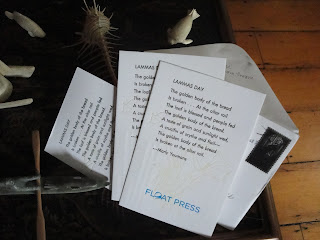Update: Book designer John Coulthart just sent me a link to this piece, in which he says Jacobson is more nuanced about genre. "The best fiction doesn't need a label." It looks interesting, and I'm going to read it now and then get back to work. Thank you, John!
High school started here on Thursday. The three children and I watched
The Lord of the Rings trilogy in celebration of the start of the youngest's sophomore year in high school (the hallways of Orcs! the all-seeing principal Eye! the young women sharp as a blade!) and finished the last bit last night, finally obliterating the sign of sin and overreaching power in the volcanic flow of Mount Doom. Of course, the movies are nothing so complex as the book in three volumes that was praised by Auden and has been dearly loved and reread by many, but it got me considering that curious man, Tolkien, off and on all week. Last night I was thinking about how interesting it is that he disliked
Macbeth and yet clearly does more than nod to it with his moving forest on Ent-march and his "no man" oracular prophecy and plot twist.
This morning I read Howard Jacobson's interview in the Guardian, where he says he is "contemptuous of genre things...." Not
books but
things. (I tend to be with Sendak in thinking that there are "good books" and then the others, but we live in a world where people like to categorize.) Jacobson goes on to reference without naming the
Twilight series and then to cite
50 Shades. Ridiculously easy potshots! I'd like to see what he thought of Crowley's
Little, Big, for example. He is also contemptuous of the term "literary fiction." He writes "fiction," he insists, while others write "crap." I know a lot of these attacks are a clever, Amis-like use of a media that desires column inches with sharp teeth and blood and hair. No doubt they are good publicity for the new book.
Those of us who write what is called "literary fiction" evidently want to be acknowledged as writing the only fiction that matters; that's why we desire that simple label, "fiction." What we do, we believe, matters more. But it ain't necessarily so. What I learned in writing two fantasies for young readers and a number of fantastic stories for anthologies is that our "literary fiction" worldview is provincial. Writers in other genres believe strongly that we write in simply another genre, one often less vital than their own. Sometimes they are right--depends on the book. It
always depends on the book. Likewise, a book in another genre can clamber up to the heights. Entertainment may fly up into the realm of art. Why not? There are no rules, only the force and heart and skill of the mind behind the keyboard. What is
The Tempest if not a romance of first love and a fantastic tale of a wand-wielding and -breaking wizard intended to please both the ruled rabble and the ruling classes?
Oh, I have sympathy for Jacobson's past situation, and am glad he has been lifted into light where he is visible. I know all about his "working away at the edges for years." No doubt the stacks of sold copies for
A Death at the White Camellia Orphanage and
Catherwood and all the rest are but very little hobbits compared to the giant cave trolls of a Booker winner or a
NYT bestseller. But hobbits are sturdy, lovable storytellers and song-makers. And the hinterlands and the edges have their advantages. From the edge, you can reach out into space that has no chart, building a world outward as you will. From the edge, the trends and bubbles of the day are only white noise, lost in the distance, and what matters from the past stands like a great field of monuments where a writer can lose and find himself in wandering.
Any of us "at the edges" would trade something for visibility, for a greater number of readers. But it's an old story; I imagine that Melville, say, would have been willing to give up a limb and hobble like a peg-leg sailor to keep the readers he had with
Typee and gain a few more
. Poe certainly wrote wild attacks with teeth and hair and gave up everything in search of a wider audience. Dickinson ventured out and then back, sealing the door. Yet they and others like them--some remembered, some not--had their painful, joyful, austere reward, just as Stephanie Meyers and the writer of
50 Shades of Gray have a reward of another kind. Let's look to Jacobson's "genre things" for what we must do about the strange ways of the world. As Gandalf says, what comes to those in a time "is not for them to decide. All we have to decide is what to do with the time that is given us."
Thanks to Damien Walter, Guardian columnist, for the Jacobson interview link.










